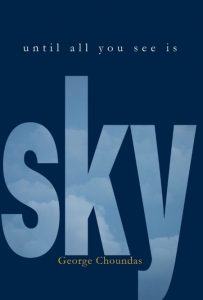
Book Review of George Choundas’s Until All You See is Sky
by Jessie Gouverneur, Potomac Review Intern, summer 2023
Are you wondering how your past can affect your present? The essay collection Until All You See is Sky is a succession of short chapters—or rather stories—that will make you travel through George Choundas’s life. By opening the book and reading through, you will get to experience how he grew up and understand how he came to writing. From the retelling of a cherished memory where the author travels to Greece with his father and his beloved Stan Smith shoes, to an interesting chapter on the battle between Greeks and Italians, to a sequence of events happening in New York City, where he lives, this essay collection will make you move through your own life with a new sight.
I was skeptical when I saw that a few chapters were dedicated to Covid. The topic can be repellent and hard to pull off because readers might be bored hearing about quarantine over and over again. Surprisingly, the writer did an excellent job at describing this odd period we have all confronted, by involving his children in the narrative. After exploring how growing up with a Cuban mother and a Greek father stirred his creativity and influenced his way of writing, we come to see how his children are a source of inspiration. We catch a glimpse of his sensitivity in the chapter “In the Covidium” via a treasured moment when his daughter “twirls” in their kitchen, the chapter closing with an echo to that same childishness: “Twirls, obviously.” Authenticity, tenderness and emotions guaranteed.
Throughout the book, the writer invites the audience into his narrative, makes them feel privileged to go along with him on his adventures, and creates a certain intimacy with his readers. The third chapter “I [Hard-Clenched Knuckle-Forward Fist] New York” is a perfect example of this sensibility as it is written in the second person. “You”, suddenly, are active, in the characters’ shoes, experiencing whatever they are going through. “You” are here, with the narrator, watching a fight between Man and Woman, the two characters at play. This depiction might come from the fact that the writer is a former FBI agent, trained to be observant and having to report what he sees with a sense of generalization.
Interestingly enough, the writer’s sentimentality emerges on paper, especially in “The Vengeances”, the chapter on Greeks and Italians, evoking his far-reaching background:
Paris steals Helen. Pries her out of her husband’s bed, seasons her lips with his own, spirits her to Troy. Of course that’s how it starts. Love is the seed of every perfidy, of every cataclysm. Even the chaste kind has its spawn.
And when he talks about traveling with his beloved Stan Smith shoes in “Paylessness,” it denotes his sensitive and poetic way of writing:
Even healthy and morning-fresh, we are swarmed over with flaws. Stendhal said beauty is the promise of happiness. That is true. It is also squalor’s paint.
The way irony is blended in all this seriousness greatly reveals the author’s authenticity:
None of this anecdote is true. I made it up. I could have done what everybody else does who claims casual knowledge of a subject. I could have skimmed the Wikipedia entry for Stan Smith and then typed out a paraphrasing.
Despite the length of his sentences, the thread of the story is very clear. The words and imagery are well chosen. For example, when describing the art of writing in “Why I Write” he says, It is thought made beautiful on a plate. And describing humanity in “Dead Now,” he relays, I and you are bits of material that catch fire for a time.
I was very surprised by the first, and only, appearance of the title on page 112. It made me wonder what the title means—or even refers to—and what it brings into question. With the last chapter taking place in New York City, I pondered the skyscrapers and how we can feel trapped, how we grow up with certain ideas and build up our personality with what we have known and learned our whole life. However, when quarantined, most of us felt stuck— especially if “you” were in New York City—and then, when the pandemic subsided, we recovered freedom. It could also relate to religion: living on Earth and going to Heaven when we die. Until all you see is sky. We all have different lives, different stories, and that is what makes life so precious. Speak your truth.
